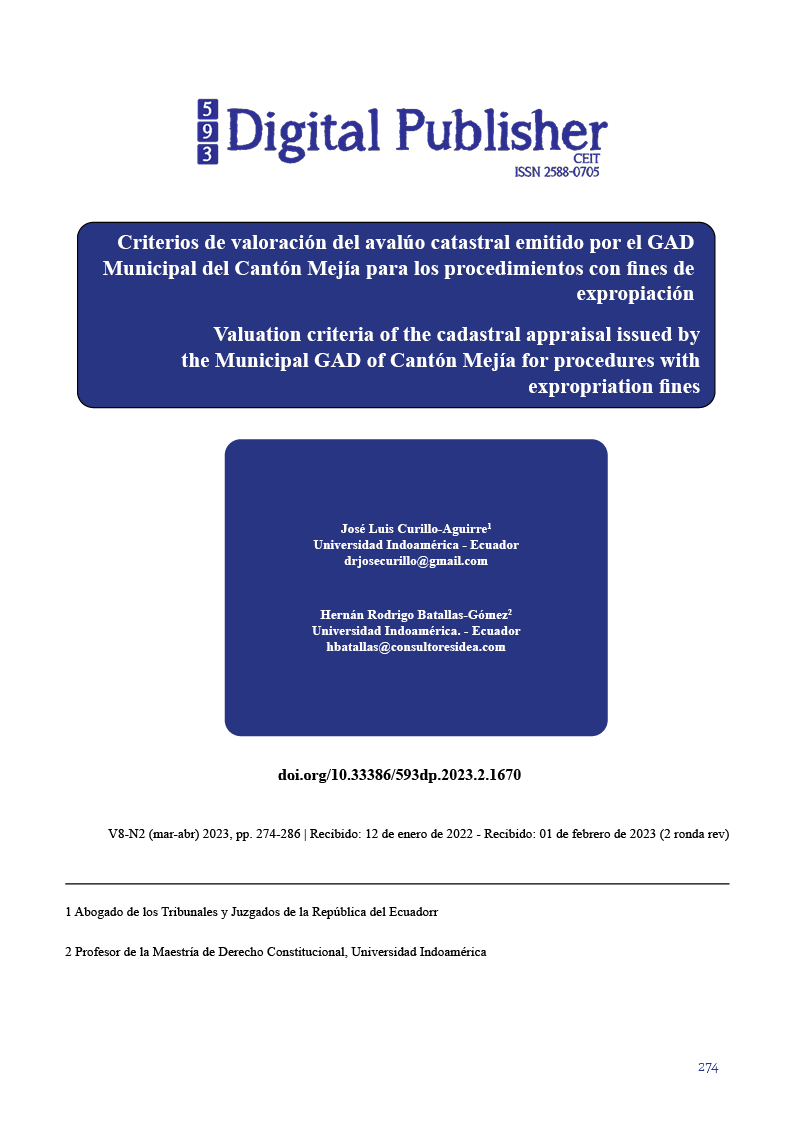Valuation criteria of the cadastral appraisal issued by the Municipal GAD of Cantón Mejía for procedures with expropriation fines
Main Article Content
Abstract
This article deals with the application of the valuation criteria of real estate declared in public utility, for the purpose of expropriation, as established in Article 495 of the Organic Code of Territorial Organization, Autonomy and Decentralization (COOTAD, 2010)
In addition, it explains the expropriation procedure in Ecuador, the determination of the fair price, based on the cadastral appraisal made by the appraisal and cadastres departments of the Autonomous Municipal Governments.
Likewise, it shows different doctrinal contributions in order to generate a clearer criterion in this regard, together with the revision of both the constitutional norms and the lower norms related to expropriations.
To carry out expropriations, the highest administrative authorities of the regional, provincial, metropolitan or municipal governments will resolve the declaration of public utility, by means of a duly reasoned act in which the individualization of the required good or goods and the purposes for which they will be used must be included.
There are authors who affirm that expropriation is an institution of public, constitutional and administrative law, which is specified with the issuance of an administrative act, issued in exercise of the expropriatory public power, contained in the Constitution.
Finally, the "Road Project Expansion to four lanes of the Alóag-Santo Domingo road, Tandapi-Unión del Toachi Section" is analyzed, carried out in 2018 by the Decentralized Autonomous Government of the Province of Pichincha (GADPP, 2018).
From the documentation provided by the GADPP, it is evident that not all the people whose real estate was affected by the expropriations received the payment of the fair price, since they were only based on reports issued by the department of appraisals and cadastres of the Municipal GAD of the Canton Mejía, in which it is not possible to determine what assessment criteria were applied at the time of carrying out the appraisal of cadastres.
Downloads
Article Details

This work is licensed under a Creative Commons Attribution-NonCommercial-ShareAlike 4.0 International License.
1. Derechos de autor
Las obras que se publican en 593 Digital Publisher CEIT están sujetas a los siguientes términos:
1.1. 593 Digital Publisher CEIT, conserva los derechos patrimoniales (copyright) de las obras publicadas, favorece y permite la reutilización de las mismas bajo la licencia Licencia Creative Commons 4.0 de Reconocimiento-NoComercial-CompartirIgual 4.0, por lo cual se pueden copiar, usar, difundir, transmitir y exponer públicamente, siempre que:
1.1.a. Se cite la autoría y fuente original de su publicación (revista, editorial, URL).
1.1.b. No se usen para fines comerciales u onerosos.
1.1.c. Se mencione la existencia y especificaciones de esta licencia de uso.
References
Calera, H. (2010). Algunas Consideraciones en torno a la Expropiacion. Chile.
CCE. (2015). Código Civil Ecuatoriano . Quito.
Constituyente, A. N. (1948). Declaración Universal de los Derechos del Hombre . Paris .
COOTAD. (2010). Código Orgánico de Organización Territorial, Autonomía y descentralización. Quito.
CRE. (1830). Riobamba.
CRE. (1998). Riobamba.
CRE. (2008). Montecristi.
DMQ. (2018). Norma Técnica para Valoración de Bienes Inmuebles Urbanos y Rurales del Distrito Metropolitano de Quito. Quito: s.e.
Enterría, G. d. (2013). Los Principios de la Ley nueva de expropiación. Pamplona.
GADPP. (2018). Gobierno Autónomo Descentralizado de la Provincia de Pichincha. Quito.
Ibagon, A. (1986). El Proceso de la Expropiacion . Bogota.
Larrea, J. (2008). Derecho Civil del Ecuador . Quito.
LODOTUGS. (2016). la Ley Orgánica De Ordenamiento Territorial, Uso Y Gestión De Suelo. Quito.
López, F. (2007). Manual de Expropiaciion Forzosa y otros supuestos . Espana .
LOSNCP. (2008). Reglamento a la Ley Orgánica del Sistema Nacional de Contratación Pública. Quito.
Memorando. (2020). GADPP Memorando N°: MEM-470-DGPLA-2020 . Quito.
PDOT. (2019). Plan de Ordenamiento territorial del GAD de Mejía. Machachi.
PUGS. (2020). Plan de Uso y Gestión del Suelo. Machachi.
Resolución. (2018). “Ampliación a cuatro carriles de la carretera Aloag – Santo Domingo de los Colorados”. Quito.
Rodríguez, F. (2013). Como se determina una Expropiacion indirecta bajo taratados internacionales en materia de inversion. Mexico.
Valencia, S. (1975). La Expropiacion. Bogota.



